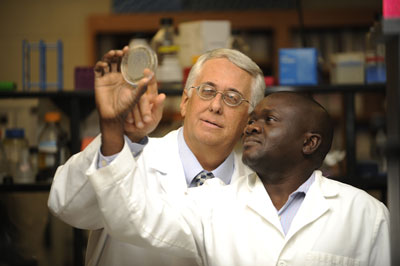| Dec 18, 2010 |
Auburn's College of Veterinary Medicine designated Center for Translational Cancer Nanomedicine
|
|
(Nanowerk News) The National Institutes of Health has designated Auburn University's College of Veterinary Medicine a Center for Translational Cancer Nanomedicine. The five-year, $1.7 million award is part of a larger, $13.5 million grant from the NIH National Cancer Institute which established a Center for Cancer Nanotechnology Excellence.
|
|
Auburn University researchers will work with a multidisciplinary team of scientists, industry and government partners to develop new nanotechnology-based strategies for treatment of lung, pancreatic and breast cancers. Studies will involve both the design and testing of new nano-therapeutic strategies and related delivery systems.
|
 |
| Valery Petrenko (left), principal investigator of Auburn's Center for Translational Cancer Nanomedicine, is shown with researcher Olusegun Fagbohun.
|
|
"The human body is naturally programmed to protect itself against cancer using its powerful immune system," said Valery Petrenko, a professor in Auburn's Department of Pathobiology and principal investigator for the center. "Unfortunately, different environmental and genetic factors can affect this ability. As a result, millions of people all over the world suffer and die from various cancer diseases."
|
|
In the U.S. alone, more than 1.5 million new cancer patients will be diagnosed and more than 0.5 million will die this year.
|
|
"To respond to this challenge, our goal is to develop a nanotherapeutic defense system that will be more powerful than the immune system in its ability to recognize and destroy appearing cancer cells in the human body," said Petrenko. "Our concept is based on the use of our proprietary phage display system - a collection of genetically engineered nanoparticles, or 'magic bullets' - that exceed the repertoire of natural antibodies and immune cells a thousand times. From this collection we select particles that specifically recognize cancer receptors and convert these particles into nanomedicines that destroy tumors."
|
|
Auburn researchers will work with recognized scientists from prominent institutions including Northeastern's Vladimir Torchilin, who will direct the center, Mansoor Amiji, Sri Sridhar and Craig Ferris; Harvard Medical School's S. Nahum Goldberg; Tufts University's Alexey Degterev ; and Nemucore Medical Innovations' Tim Coleman.
|
|
At Auburn, Petrenko established a research program focusing on the concept of phage-driven drug delivery. "I am very happy our team could receive the support to translate our novel concept for production and clinical practice," he said.
|

